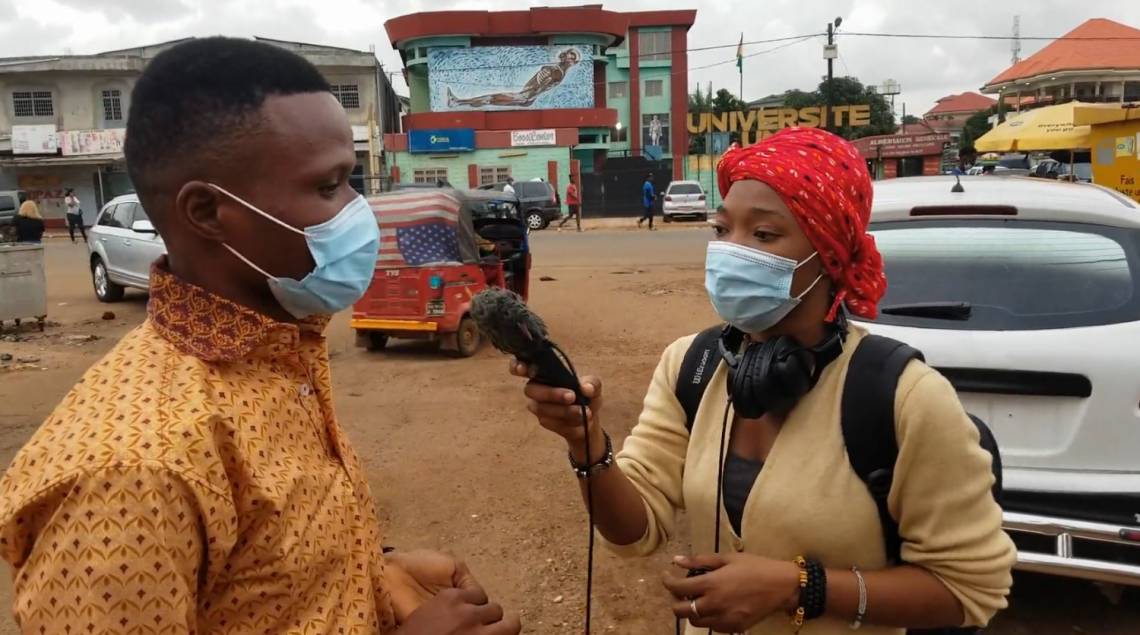Since June 2020, Fondation Hirondelle has been implementing programs to support local communities faced with the COVID crisis, with partner media on the ground in Uganda, Guinea and Sierra Leone. A project funded by the H2H network, supported by UK Aid.
For many of us, access to information on the coronavirus is easy and we take it for granted. From the early days of the outbreak we were kept up to date on where the virus was spreading, what the symptoms were and what measures were being put in place. Now, in a matter of seconds, we can find out how many cases of Covid-19 have been reported in our area, how the new vaccines work, where to get tested and what the test will likely involve. We can witness journalists holding our leaders to account and challenging authorities on failings in their responses.
Of course, we are also confronted with a wealth of false claims – no country has been spared exposure to harmful mis- and dis -information, rumours and conspiracy theories. But for those of us with access to reliable media and the ability to know where to look for verified information, the latest facts, guidance and findings are there if we want them.
Yet for millions of people, finding out even the basics about the virus is difficult - information is at best scarce, and at worst, dangerously misleading. Many communities in poor or remote areas do not have the internet at their fingertips nor reliable sources which speak their language. Word of mouth is therefore the main vehicle for news, often distorting the facts and layering them with misconceptions. For those lucky enough to have smartphones, there is often nowhere to turn to for verification of the claims that spread through social media and messaging apps – is Covid-19 really an invention by the West? Is it true I can protect myself by avoiding spicy food? Are Africans guineapigs for treatments? Should I stay away from Chinese/Asian/white/Christian/Muslim people?
This is why local media have a fundamental role to play as a lifeline to populations in health crises, and the reason why our Fondation Hirondelle H2H-funded coronavirus project was warmly welcomed by media houses and audiences alike.
The project provided resources for media enabling them to help populations navigate the crisis. This meant increasing both accessibility and quality of information in dozens of local languages. For example, transmission equipment supplied to the network of community stations, Radio Rurale de Guinée allowed radio channels to reach people in remote areas, providing coronavirus productions by the Association de Journalistes Scientifiques de Guinée.
In Uganda, Media in Cooperation and Transition and the East Africa Radio Service developed a highly popular coronavirus Radio Drama, The Pearl, which was broadcast via a network of radio partners covering 80% of the country, and hosted on Viamo’s 3-2-1 platform, allowing people with basic phones to dial in to a free number in order to listen to episodes.
As well as offering solution-focused, potentially life-saving information about the virus and its wider impacts, programmes aimed to be engaging, clear, and rooted in audiences’ everyday realities. It was also important to consider the needs of different people; mainstream media often neglects to give voices to the most vulnerable. In Sierra Leone, Radio Mount Aureol-Cotton Tree News created dedicated content for those suffering from disabilities. For example highlighting the challenges faced by people with sight or hearing problems, for whom social distancing and mask-wearing sometimes created a feeling of isolation and helplessness as they could no long read lips, voices became muffled, and others became reluctant to approach to them when they needed help.
In all three of the project countries, audiences were so excited about the programmes that, in response to popular demand from audiences who wanted to listen again, radio stations ended up re-broadcasting them without charging transmission fees.
This enthusiasm is testament to the fact that all of us need to be able to understand the world around us and make informed choices. Reliable information cannot and must not be taken for granted - it requires continuous investment and commitment - and in times of crises, it can mean the difference between life and death.
Jacqueline Dalton, COVID Programme Manager, Fondation Hirondelle
More information on Fondation Hirondelle and our COVID response here.
Fondation Hirondelle’s partners in this project:
Association de Journalistes Scientifiques de Guinée
Media in Cooperation and Transition and East Africa Radio Service
Radio Mount Aureol – Cotton Trees News
Radio Rurale de Guinée
Viamo




